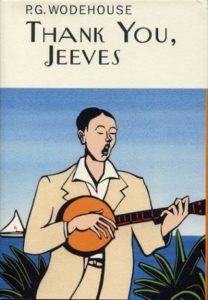Books
Jeeves and Blackface

Clearly P.G. Wodehouse was by no means going to be beloved of egalitarians. Although immensely charming, his works are primarily nostalgic yearnings for a world of harmlessly genteel and likable aristocrats benefitting from inherited cash and titles, using an enormous equipment of servants, and largely oblivious to the skin world (like these pesky world wars).
Positive, there’s a subversive bent to Wodehouse’s most well-known creations: the dopey bachelor Bertie and the unflappable valet Jeeves. For Jeeves – as Bertie is consistently reminded, to comedian impact – has a superb thoughts, and is way more succesful than the feckless Bertie. It may be argued, although, that Jeeves’ contentment with being employed by such a nitwit is itself reassuring. Their relationship means that even probably the most proficient and famend of the working courses gained’t stand up in opposition to the rich courses which have finished nothing to earn or keep that wealth.
So we are able to argue backwards and forwards over how classist Wodehouse’s tales actually are. Largely, although, they avoid overt racism, usually as a result of his world is lily-white. An exception is Thank You, Jeeves, as a result of blackface is a key plot engine of this comedian caper.
Thank You, Jeeves includes a sometimes intricate and foolish stratagem to get out of a sometimes intricate and foolish conundrum: Bertie’s been invited to dinner on a yacht owned by an American millionaire. They’re to be entertained by a gaggle of black musicians. However the American first traps Bertie in a stateroom, holding him hostage to make sure that he’ll marry the millionaire’s daughter. Jeeves involves Bertie’s rescue by encouraging him to use boot polish to his face and fake to be one of many musicians, so he can get the hell off the boat.
As Jeeves says in his sometimes deferential and understated method, “I’ve a small tin of boot polish right here, sir. I introduced it with me in anticipation of this transfer. It could be a easy activity to use it to your face and palms in such a fashion as to create the phantasm, must you encounter Mr Stoker, that you simply had been a member of this troupe of negroid entertainers.”
“Negroid entertainers,” to make use of Jeeves’ time period, is the least offensive description utilized within the e-book to the musicians, which supplies a way of how a lot they’re dehumanized. One character assumes that a black man is more likely to be a thief. There’s repeated and careless use of a racial slur.
After his escape from the yacht, Bertie spends a great deal of time wandering across the village, hiding from folks, and making an attempt in useless to clean his pores and skin and purchase both butter or petrol to take away the polish. Wodehouse makes an attempt to mine a lot comedy out of others’ response to dark-faced Bertie. An inebriated valet insists he’s the satan. A maid goes into seizures. Bertie is taken into account unfit for well mannered society till he’s white once more. You get the thought.
In fact there’s a protracted and exhausting debate available over the best way authors take in dangerous influences from their time and place, which must be correctly contextualized when studying these authors later, lest they be judged by an unfair set of requirements. And it’s doable to take pleasure in beloved authors whereas recognizing and being upset by the methods they dehumanized folks of various courses, genders, races, sexualities, and different identities.
Concepts of what’s problematic in fiction can change quickly. Apparently, a 1998 radio adaptation of Thank You, Jeeves turned the minstrels into “hillbilly performers,” which itself may very well be seen as classist.
However the blackface/minstrelsy plot of Thank You, Jeeves is so startling, so in depth, and so recurrent as a supply of tried comedy that it spoils the e-book. This isn’t a passing reference to racial inferiority (though after all the casualness of that form of reference would itself be symptomatic of a sure form of racism). That is completely embedded into the storyline, making it laborious to root for Jeeves, Wooster, or any of the opposite characters implicated. (No black character is given a reputation or any dialogue, after all.)
How a lot is an excessive amount of? Ought to we not be making excuses in any respect? Or ought to literature be approached extra like historical past or anthropology, with caveats about cultural influences of the time? I’d love to listen to from others.



